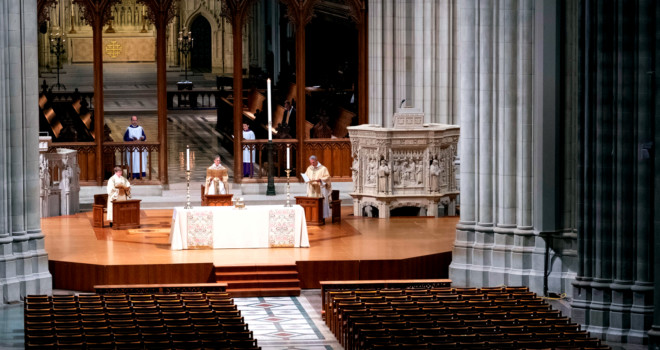Ordination season has rolled around again, but this year, it looks very different. Most, if not all, ordinations this year are private Masses. If you have ever been to an ordination Mass before, you know how unusual that is. By their very nature, ordination Masses are a celebration for the entire Church — the gift of a new priest being given to the people of God. Ordination Masses are typically standing room only, and hours long.
Not these days.
Ordination Masses are livestreams this year or can be attended in person by invitation only. We have already experienced both types this year. (As a member of the seminary faculty, my husband and our family were invited to our diocese’s priestly ordination.)
Even in person, the ordinations are different. Everyone is wearing masks (except my toddler, who adamantly refused). When the bishop holds the hands of the about to be ordained men, to receive their promise of obedience to him and his successors, both parties wear gloves. The normal fraternal embrace shared between the newly ordained and their brother priests is omitted. The number of priests present is dramatically reduced. There are no long lines for “first blessings” — when normally the newly ordained greet individuals and families post-Mass and offer them their blessing. But, despite all of that, these ordinations are more a sign of hope than ever.
A Sign of Hope
The sound of babies crying at Mass is a sign that the Church is alive and well — but so is the sight of newly ordained “baby priests” (as they are affectionately called). Throughout this ordination season, I have been reminded of the first time that I heard the story of St. John Paul II. John Paul II attended an underground seminary during World War II in Poland. Now having experienced the joy and comradery of a seminary environment, I cannot imagine how different that would have been. Wouldn’t there have been something missing from his formation?
But now, watching these men who are my friends, my brothers, my spiritual sons, navigate seminary and their ordinations during this pandemic, I am beginning to understand. The men getting ordained to the priesthood and the transitional diaconate this year have certainly had their vocations tested. Last year, they were faced with a newly erupted scandal in the Church, and the stark reminder that, with their “yes” to God, they would bear a stigma. This year, they have had to navigate the climate of a pandemic, figuring out ways to continue to reach the people of God, being willing to expose themselves to possible contagion in the midst of their ministry, and foregoing many of the traditions and celebrations that come with an ordination.
Yet, they are not robbed of joy. In some ways, their joy is more intense.
This year’s transitional deacons were manning the doors of the cathedral for the priestly ordination Mass, and the smiles beneath their masks were unmistakable. Their ordinations and vocations are not about the party or the acclaim — they are about becoming “another Christ.” Suffering comes with the territory. And these men are all willing to suffer for the love of Christ and His Church.
Their strength of conviction, their whole-hearted assent to God’s call (even amid so much adversity) is a sign of hope. It is a reminder that God is still at work in his Church, providing for Her as he promised.
The Gates of Hell Will Not Prevail
Christ promised that the gates of hell would not prevail against his Church. What does this mean? Surely, it means that evil will not prevail against the Church, but it means even more. There are moral evils and “natural” evils in the world — sickness, natural disaster, etc. Both are a direct result of the Fall, which has left our world broken and hurting.
When Christ promises that the gates of hell will not prevail against his Church, he is not just referring to malicious acts, sins, and heresies. He means that nothing will defeat his Church. Or, to put it more eloquently:
For I am convinced that neither death, nor life, nor angels, nor principalities, nor present things, nor future things, nor powers, nor height, nor depth, nor any other creature will be able to separate us from the love of God in Christ Jesus our Lord.
Romans 8:38-39.
There is no denying that a pandemic is a scary thing to live through. It is a fact that this current pandemic has led to suffering and death on a larger scale that most of us have experienced in our lifetimes. Even if we have not lost anyone in our immediate circle of family and friends, our hearts still ache with compassion for the thousands lost to this illness, especially those who have died without their loved ones by their side.
But our hope is in this — Christ’s love prevails. His love was most perfectly revealed to us in an act of suffering on the cross, and his love continues to be revealed to those who are suffering today. Suffering cannot cut us off from him, nor is it a sign of his punishment or abandonment. He is there, with us, in our midst, and more closely united to us than ever before.
As I look at these new priests and transitional deacons this year, I can see it in their eyes — Christ, still present in our midst. Christ, continuing to love and care for his people.
✠
image: Donovan Marks / Shutterstock.com












